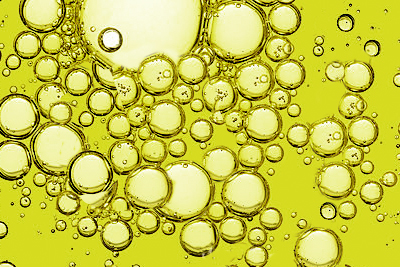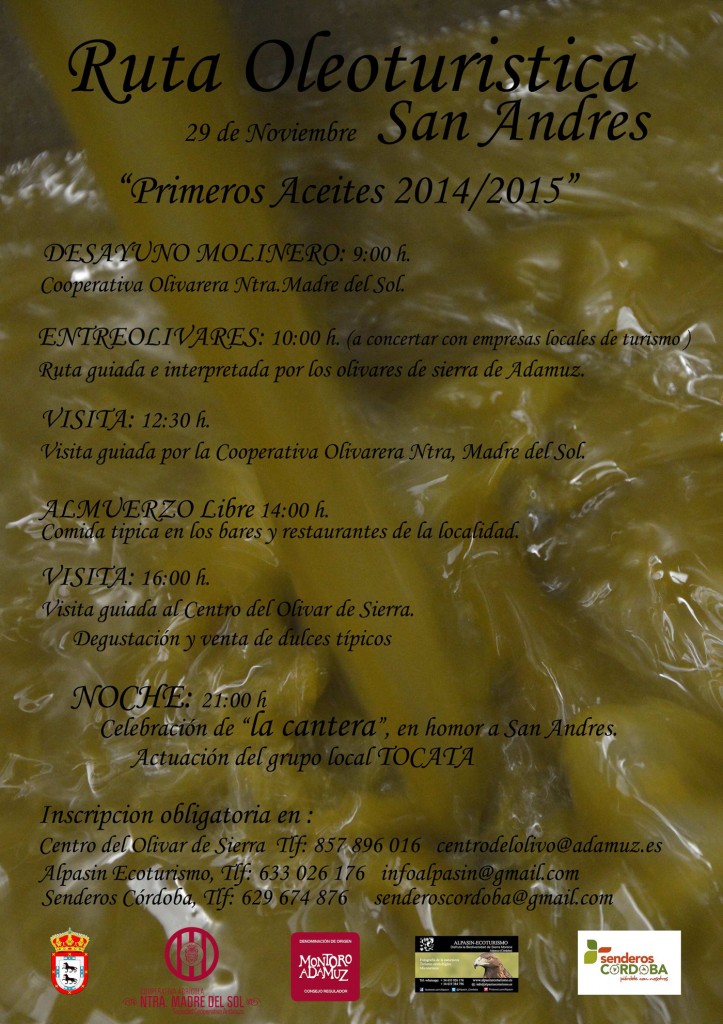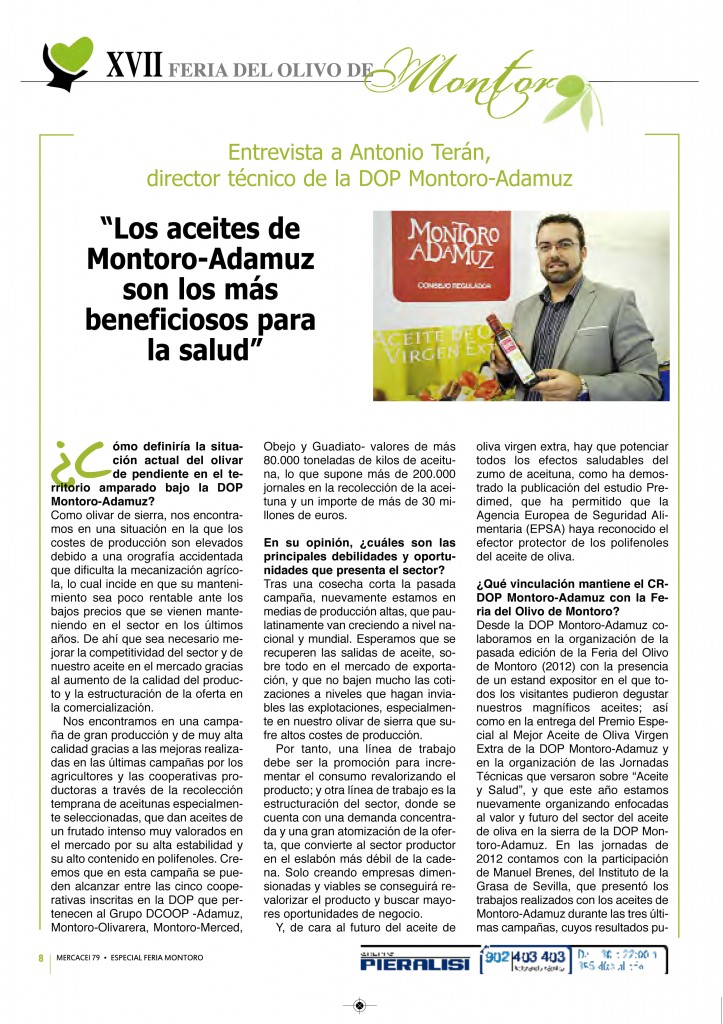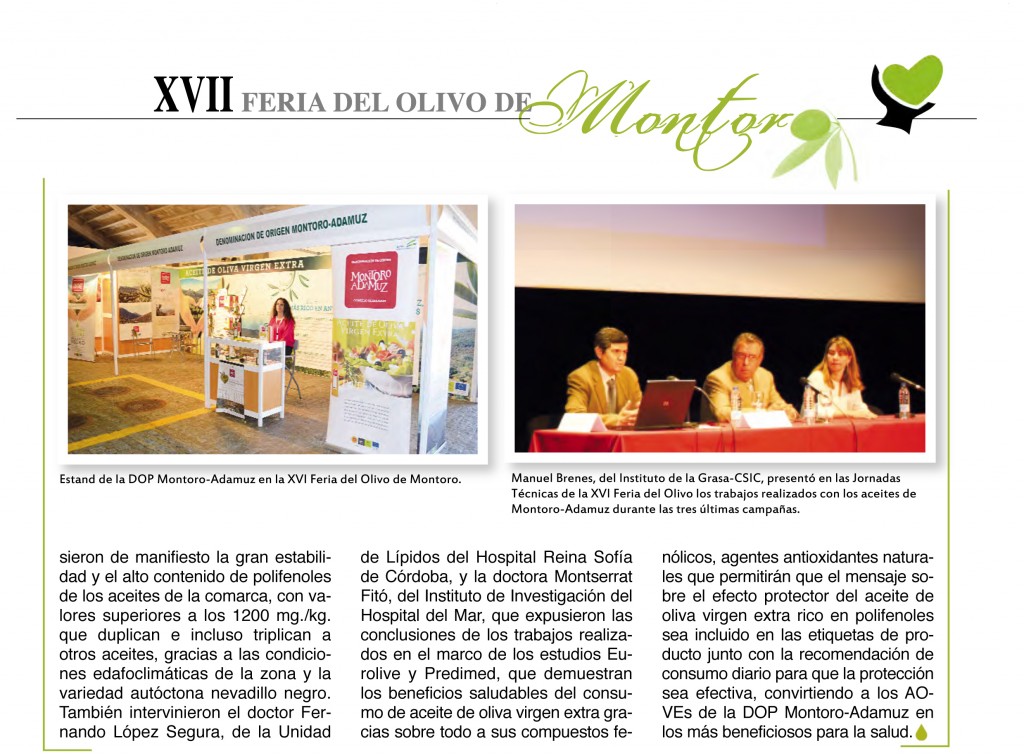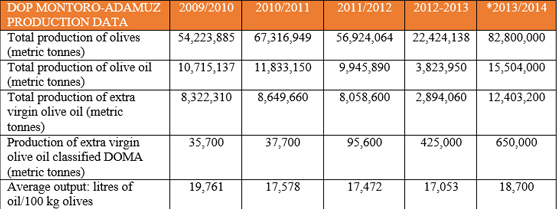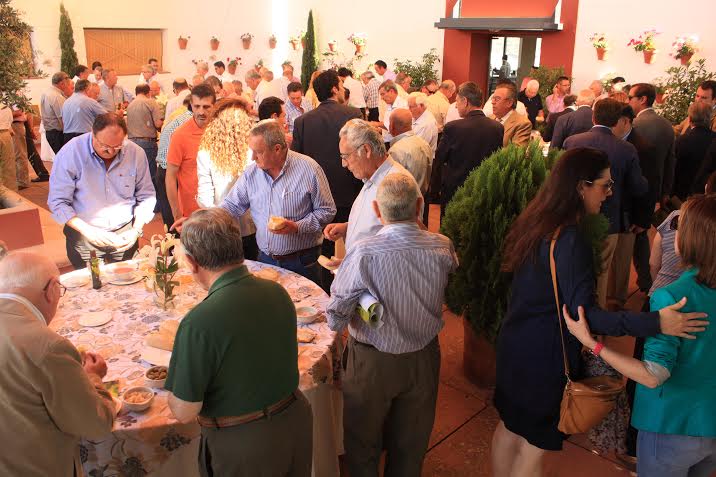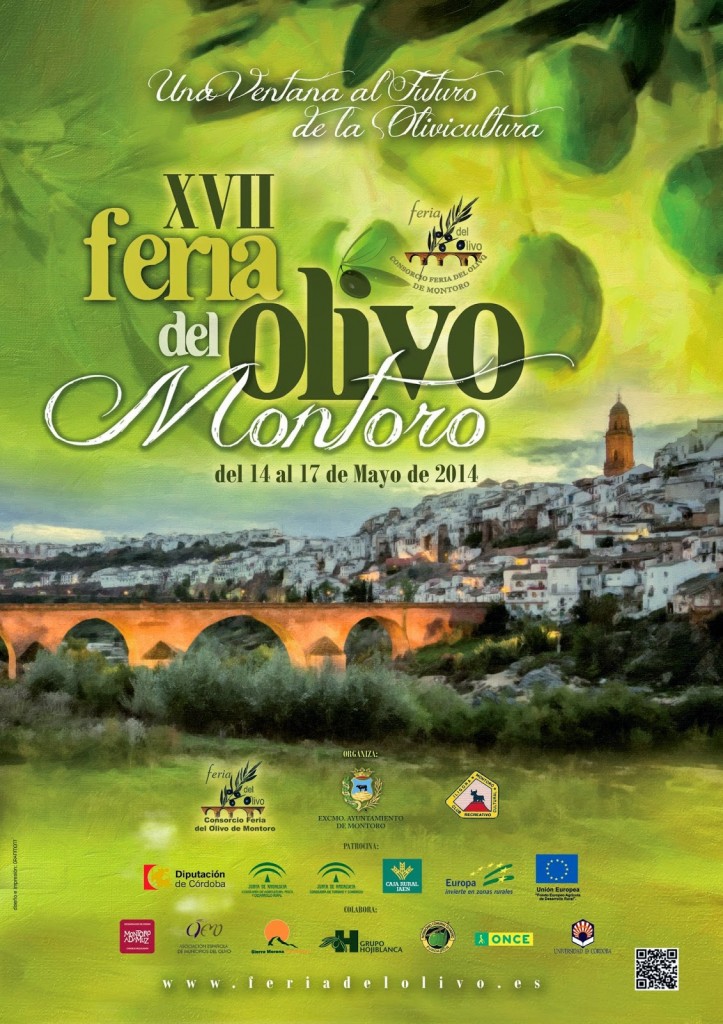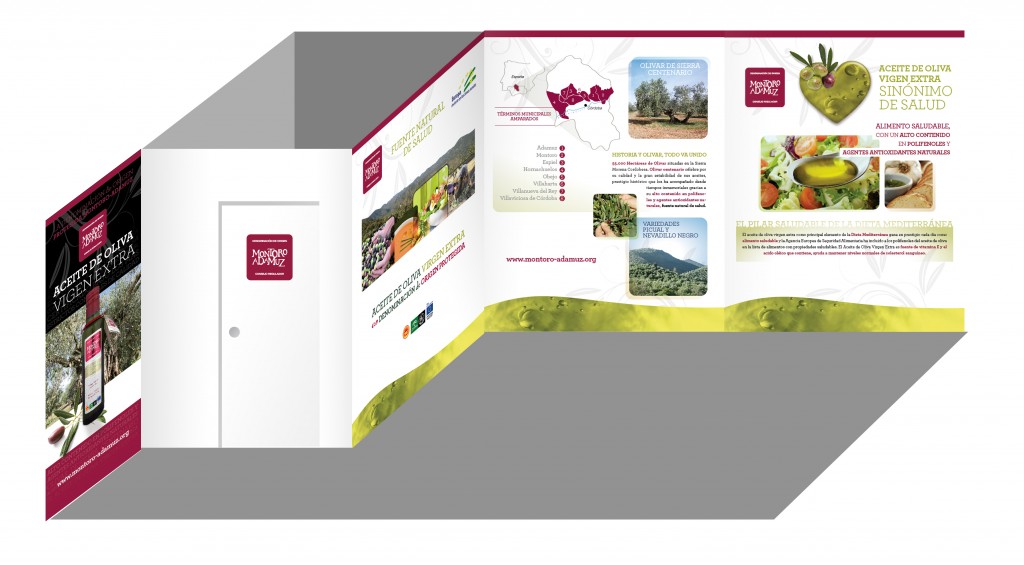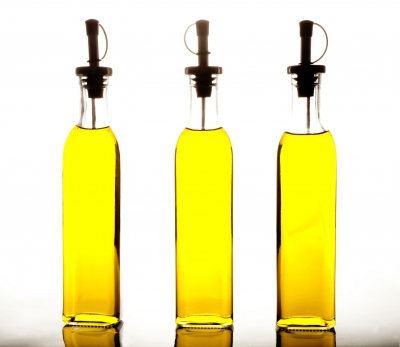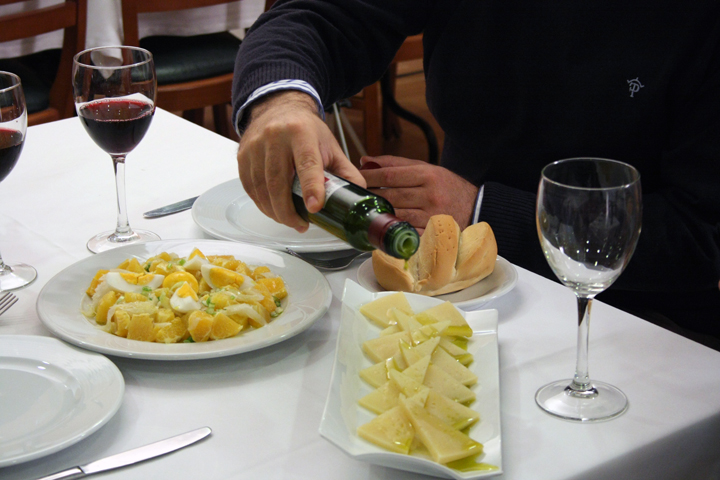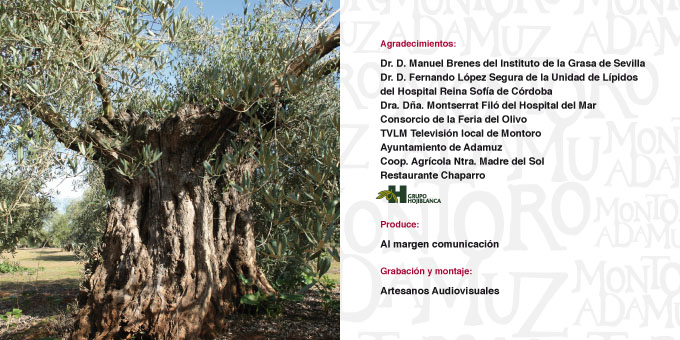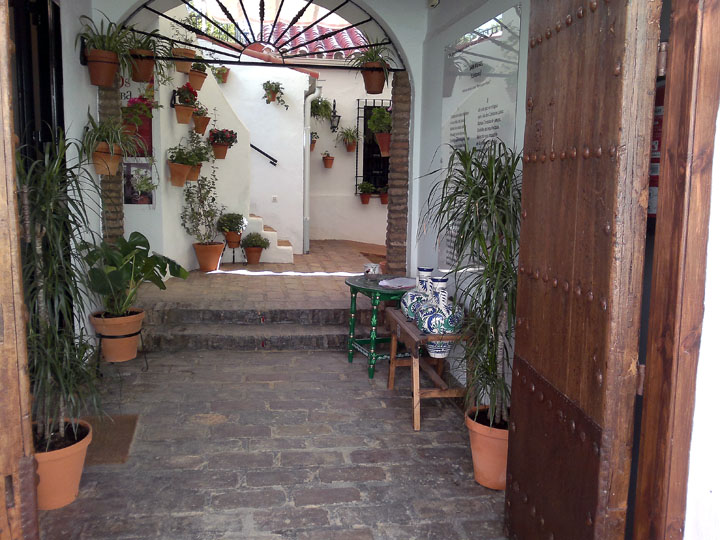Tag Archives: fenolicos
El AOVE contra la enfermedad intestinal inflamatoria
Entre los recientes descubrimientos sobre los efectos beneficiosos del AOVE y en concreto de sus principios bioactivos y de los polifenoles en particular tenemos resaltar el efecto sobre los procesos inflamatorios que afectan al tubo digestivo. Entre estas enfermedades podemos destacar la Colitis Ulcerosa y la Enfermedad de Crohn. Ambas desarrollan un proceso inflamatorio crónico que normalmente es tratado con antiinflamatorios y anticuerpos dirigidos contra las citocinas proinflamatorias.
El tratamiento actual no cura la enfermedad de la que se desconoce su origen, actualmente se cree que puede ser desencadenada por la infección de algún virus o bacteria no identificado. Por ello es muy difícil buscar un tratamiento efectivo. En la búsqueda de soluciones eficaces se ha investigado el efecto que la dieta tiene sobre estos pacientes. La mayoría de estos estudios se han realizado sobre animales, y en concreto en la Revista Food & Nutrition trata el tema y la conclusión que se deriva es que la mayoría de los polifenoles inhiben las manifestaciones de estas enfermedades ayudando a regular la inflamación y otros parámetros relacionados con la misma.
Algunos componentes fenólicos del aceite de oliva virgen extra como la oleuropeina, hidroxitirosol o el tirosol han demostrado su eficacia en la inflamación intestinal en ratas mejorando otros parámetros. Otro de los estudios concluye que el AOVE también podría ser beneficioso contra la colitis ulcerosa.
Los aceites de oliva virgen extra ricos en polifenoles son los mas beneficiosos para la salud. Complementar una dieta mediterránea equilibrada, con un aove rico en polifenoles y principios bioactivos es muy recomendable ya que ayuda a prevenir multitud de efermedades. En la Denominación de Origen Protegida Montoro – Adamuz llevamos más de 7 años trabajando en esta línea, produciendo los aceites más ricos en polifenoles y por ende fuente natural de salud.
Fuentes:
http://www.infaoliva.com/documentos/boletines/RESUMEN%20DE%20PRENSA%20%20%2026.5.2015.pdf
http://www.ideal.es/jaen/jaen/201505/25/aove-beneficioso-enfermedad-intestinal-20150524195026.html
http://www.cmed.es/enfermedad-inflamatoria-intestinal.php
http://elpais.com/elpais/2015/05/11/ciencia/1431355310_796945.html
El aceite de oliva remedio contra el Parkinson
Ana Rosa Cañuelo Navarro profesora del departamento de Biología Experimental de la Universidad de Jaén e integrante del grupo de investigación “Estrés Celular y Edad” presentó dentro del marco de Expoliva 2015 una investigación que está analizando el efecto neuroprotector de los polifenoles del olivo en la enfermedad de Parkinson.
 El aceite de oliva virgen extra es único entre los aceites vegetales debido a la elevada concentración de compuestos fenólicos que posee, entre los que se incluyen hidroxitirosol, tirosol, oleuropeína, ácido 4-hidroxifenilacético y ácido cafeico, entre otros. Aunque cada vez son más los estudios que ponen de manifiesto las propiedades anticancerígenas, antiinflamatorias, bactericidas y cardioprotectoras de estos compuestos, el interés por sus efectos sobre el envejecimiento o en enfermedades neurodegenerativas es más reciente y existen menos estudios al respecto.
El aceite de oliva virgen extra es único entre los aceites vegetales debido a la elevada concentración de compuestos fenólicos que posee, entre los que se incluyen hidroxitirosol, tirosol, oleuropeína, ácido 4-hidroxifenilacético y ácido cafeico, entre otros. Aunque cada vez son más los estudios que ponen de manifiesto las propiedades anticancerígenas, antiinflamatorias, bactericidas y cardioprotectoras de estos compuestos, el interés por sus efectos sobre el envejecimiento o en enfermedades neurodegenerativas es más reciente y existen menos estudios al respecto.
En concreto el grupo “Estrés Celular y Edad” ha demostrado que uno de estos fenoles simples en concreto el tirosol, puede retrasar el envejecimiento y aumentar la longevidad en un modelo animal mediante la modulación de rutas de señalización específicas. El proyecto se centra en la investigación de los efectos principales de los agentes fenólicos procedentes del olivo cuando se agrega la proteína α-sinucleína, uno de los principales factores que influyen en el desarrollo y en la progresión del Parkinson.
La enfermedad de Parkinson (PD) es el segundo desorden neurodegenerativo en cuanto a prevalencia en la población y se caracteriza por la aparición de movimientos involuntarios, temblores, rigidez muscular y dificultades en el mantenimiento del equilibrio, como consecuencia de la pérdida de neuronas dopaminérgicas en la sustancia nigra del cerebro.
En los últimos años son bastante numerosos los estudios tanto in vitro como in vivo que investigan los efectos de distintos compuestos fenólicos para prevenir el daño neuronal en diversas patologías neurodegenerativas.
 Concretamente, en esta enfermedad algunos de estos compuestos, como la curcumina, poseen un efecto neuroprotector no sólo en modelos animales sino también en humanos. Aunque los mecanismos concretos mediante los que este tipo de moléculas ejercen su acción neuroprotectora aún no están claros, se ha sugerido que éstos podrían estar relacionados con la capacidad para neutralizar especies reactivas de oxígeno y de nitrógeno, con la regulación de rutas de señalización asociadas con la supervivencia celular y la inflamación, así como con la capacidad para inhibir la agregación de proteínas implicadas como la α-sinucleína.
Concretamente, en esta enfermedad algunos de estos compuestos, como la curcumina, poseen un efecto neuroprotector no sólo en modelos animales sino también en humanos. Aunque los mecanismos concretos mediante los que este tipo de moléculas ejercen su acción neuroprotectora aún no están claros, se ha sugerido que éstos podrían estar relacionados con la capacidad para neutralizar especies reactivas de oxígeno y de nitrógeno, con la regulación de rutas de señalización asociadas con la supervivencia celular y la inflamación, así como con la capacidad para inhibir la agregación de proteínas implicadas como la α-sinucleína.
La investigación sigue abriendo camino y demostrando los beneficios de los compuestos fenólicos procedentes del AOVE y de sus efectos saludables. Los aceites de oliva virgen extra de la Denominación de Origen Montoro-Adamuz son los mas ricos en polifenoles y por lo tanto fuente de salud.
Fuente el Ideal de Jaén y Olimerca
Oleocanthal, an exciting discovery
The best discoveries sometimes happen due to a coincidence or intuition.
This is the case with the American biologist Gary Beauchamp, discoverer of Oleocanthal, a molecule present in extra virgin olive oil with a strong anti-inflammatory effect.
It turns out that Beauchamp, who gave a speech at the Council of Cordoba on 21st November, invited by the Oleocanthal Society of Andalusia, QVExtra International Association and the Spanish Association of Olive Municipalities, owes this great discovery to chance.
While in Sicily for work he tried the olive oil and detected a flavour similar to that of ibuprofen. This simple perception was the chance start of research that has revealed some extremely surprising data.
The Oleocanthal molecule, present in extra virgin olive oil, has an anti-inflammatory power comparable to that of the non-steroidal inhibitor known as ibuprofen, one of the most widely used drugs worldwide. However, there is one difference between them: Oleocanthal has no side effects for health.
This news is even better if we take into account its role in the prevention of rheumatic illnesses, cardiac disorders, respiratory problems, Alzheimer’s, etc.
However, not all extra virgin olive oils contain the same proportion of Oleocanthal. This depends on many conditioning factors that at first sight seem insignificant in the eyes of non-experts: the quality of the production, the harvesting dates and the types of olive.
In our country, and of course in the PDO Montoro-Adamuz, we can feel very proud as Spain is the main producer of this type of extra virgin olive oil.
Oleocanthal has been added to the long list of health benefits of our oil, something that is demonstrated in the study we carried out in 2008 on the level of polyphenols in our extra virgin olive oils. These have a high content of phenols, much higher than, in some cases three times more than, those in other oils on the market.
(Image from Andreas Levers)
San Andrés Olive Tourism Route
Report in Mercacei
The latest issue of Mercacei Magazine has a special report on the 17th Montoro Olive Tree Trade Fair, in which, as you know, PDO Montoro-Adamuz has a particularly important role.
Over the six pages of this report, the publisher specialising in the olive oil industry gives a detailed description of the characteristics of the mountain olive grove which is characteristic of our PDO, situated in the municipal towns of Montoro, Adamuz, Espiel, Hornachuelos, Obejo, Villaharta, Villanueva del Rey and Villaviciosa de Córdoba.
It highlights our sustainable agricultural practices and traditional harvesting techniques which try, as many of you know, to prevent soil erosion with natural plant cover.
The report also points out the origin of the high polyphenol content of our extra virgin olive oil: “The soil and climatic conditions of the mountain olive groves, situated on acidic, poor and shallow soils, are an exception within the olive groves of southern Spain that, together with the high levels of evapotranspiration and amount of sunshine that provoke stress in the plant, lead to a high content of polyphenols in the oil”. It also adds a mention of the careful cultivation and harvesting of our fruit.
It provides an overview of the health benefits of the high content of polyphenols and antioxidant agents in our extra virgin olive oil; emphasising our work in quality certification.
The report includes an interview with our technical director, Antonio Terán, which you can read below, in which he responds to questions regarding the mountain olive grove and the industry’s prospects.
Without a doubt this report is a big boost to our efforts to promote our extra virgin olive oil, something that is fundamental for our competitiveness in the domestic and international markets.
Mercacei is one of the leading publishing groups with the greatest prestige within the industry, involving notable collaborators and experts from the world of olive oil and winningnumerous international awards for its informative work.
Quality, the key to competitiveness
 Following a short harvest last season we are glad to see the figures showing what we have already handled in this season. Although unconfirmed, the figures already look much more positive than in previous years, as can be seen from the following table.
Following a short harvest last season we are glad to see the figures showing what we have already handled in this season. Although unconfirmed, the figures already look much more positive than in previous years, as can be seen from the following table.
With these figures, we expect oil sales to recover, especially in the export market, and for prices not to fall to the levels that make the business unviable, especially in our quality segment. While quality is the key to competitiveness it leads to high production costs.
Just looking at the five cooperatives from the DCOOP Group, registered in the PDO Montoro-Adamuz (Coop. Agr. Ntra Madre del Sol, Olivarera de Montoro, Coop. Oliv. Ntra. Sra. de la Merced, Olivarera del Guadiato and Coop. del Campo San Antonio Abad) we have figures of more than 80,000 tonnes of olives. This represents more than 200,000 daily wages in the harvest and an income of more than 30 million euros.
Of these figures, around 50% corresponds to the activity of the Coop. Agr. Ntra. Madre del Sol which has also obtained high quality olive fruit of an intense green, highly valued in the market due to their good stability and high content of polyphenols.
All of this has been possible thanks to the improvements made over the last two years in the reception and milling of the olives from our production cooperatives.
The quality of the oil depends not only on the quality of the fruit, but also on caring for it throughout the entire oil production process. Mishandling the olive in the field or in the mill may damage it and lower the category of the oil. Therefore, the farmer and the oil mill are key to the quality of extra virgin olive oil.
At PDO Montoro-Adamuz, therefore, one of our functions is to strengthen the structure of our cooperatives, focusing on the control and improvement of the production quality. However, another of our commitments must be promotion, in order to enhance the value of the product, guaranteeing its origin and quality.
Only with viable and structured companies will we be able to increase the value of our product, which will in turn open the door to export markets (a path that we have already begun to take and that is providing great results).
Long live the Mediterranean diet
Today in our blog we want to highlight the results of two recent pieces of research that have come out of the PREDIMED Study, which we have already spoken about at times.
The reason for choosing these two pieces of research is that both have come to similar conclusions which are very encouraging in terms of human health: a diet rich in polyphenols, such as the Mediterranean diet (based on extra virgin olive oil) contributes to reducing mortality.
The first of these pieces of research is the one that has been coordinated by Doctor Rosa Mª Lamuela, director of the Natural Antioxidants Research Group at the Department of Pharmacy at the University of Barcelona. This has also involved researchers from Rovira i Virgili University (URV).
In this research, which forms part of the doctoral thesis of Ana Trasserra, there has been further analysis of the data provided by the PREDIMED study, which studied people aged between 55 and 80 with cardiovascular risks.
The resulting figures could not have been more positive: this researcher found that the mortality rate (due to cardiovascular diseases or otherwise) of those people who had followed a diet rich in polyphenols was much lower than among the people who had not followed a similar diet.
After her analysis, she also highlighted that certain types of polyphenols were responsible for this reduction in mortality: first we have the stilbenes, present in grape skin and concentrated in red wine; and second we have the lignans found in foods such as olives, sesame and flax seeds and whole grains.
Doctor Lamuela explained that “in other populations studied previously, the consumption of any of the foods rich in polyphenols was not sufficient in itself to reduce mortality, but in our study the consumption of polyphenols was examined more widely, coming from different food sources”. In other words, consuming a variety of types of polyphenols is the key to increasing our life expectancy.
The second study that we want to tell you about focuses specifically on the relationship between the different types of olive oil and the risk of cardiovascular disease, and has been undertaken by the same research groups, although coordinated in this case by Jordi Salas Salvadó, professor at the URV.
This study reveals that if the daily consumption of extra virgin olive oil is increased by 10 grams, mortality due to cardiovascular problems is reduced by 10%. Among the oils, extra virgin olive oil is the best quality due to having a high content of polyphenols, a feature of the oil from the PDO Montoro-Adamuz.
Without a doubt these are two good news stories that once again make us proud of our oil, one of those with the highest content of polyphenols, and make us want to say “Long live the Mediterranean diet!”, as it lengthens our lives.
Course on the Sensory Analysis of Extra Virgin Olive Oil
One of the professional activities carried out in the framework of the 17th Montoro Olive Tree Trade Fair, and one of the most popular this year, was the Course on the Sensory Analysis of Extra Virgin Olive Oil.
A group of 25 students, consisting of millers and experts from the region’s cooperatives, attended this course at the Hotel Mirador in Montoro.
 The first day, 14th May, was led by Brígida Jiménez Herrera, director of theAndalusian Institute of Agricultural and Fisheries Research and Training (IFAPA) in Cabra, who spoke to the participants about the organoleptic properties of extra virgin olive oil. There was then a tasting of international oils and another of the different varieties and blends of oil.
The first day, 14th May, was led by Brígida Jiménez Herrera, director of theAndalusian Institute of Agricultural and Fisheries Research and Training (IFAPA) in Cabra, who spoke to the participants about the organoleptic properties of extra virgin olive oil. There was then a tasting of international oils and another of the different varieties and blends of oil.
The person responsible for running the second day of the tasting course was José María Horcas, head of the laboratory panel at DCOOP. He explained to the participants the features and characteristics of the extra virgin olive oil from the PDO Montoro-Adamuz and the DO Antequera. After his presentation the students took part in a tasting of the olive oils from those designations of origin.
3rd Technical Workshop of the PDO Montoro-Adamuz
With the involvement of more than 200 people, the 3rd Technical Workshop of the PDO Montoro-Adamuz has been one of the highlights of the 17th Montoro Olive Tree Trade Fair (held from 14th to 17th May 2014). In this edition it focused on the values and future of extra virgin olive oil in our designation of origin.
The first presentation in these workshops, dedicated to professionals from the olive industry, was given by the renowned Doctor Ramón Estruch from the University of Barcelona, manager and coordinator of the PREDIMED Study about the effects of the Mediterranean diet on the prevention of cardiovascular diseases. During his presentation he emphasised the conclusions of this study, which show the benefit of consuming extra virgin olive oil, making it clear that “4 or 5 tablespoons per day does not make you gain weight, but rather improves both good and bad cholesterol”.
Moreover, Teresa Pérez Millán, manager of the Interprofesional del Aceite de Oliva organisation, stressed that the level of polyphenols in extra virgin olive oil is what provides its health benefit. In that regard, she highlighted the advantages of the oil from our designation of origin, one of the richest in polyphenols.
Additionally, Pérez Millán noted the need to promote extra virgin olive oil to tourists in order for them to “appreciate our product”, highlighting the different campaigns being carried out by the “Aceites de España” brand throughout the world.
One of the central themes of the technical workshops was undoubtedly the issue surrounding the Common Agricultural Policy (CAP) and mountain olive groves with natural difficulties, a theme that Rafael Sánchez de Puerta, chairman of the EU Olive Oil Advisory Group, addressed in his speech.
Sánchez de Puerta argued that the “CAP must have a better outlook” and said that to achieve this it will be “essential to develop the Rural Development in Andalusia programme”. As he mentioned, this programme will have a budget of 1,900 million and will be managed by the Rural Development Groups (RDG) of Andalusia, who will surely be committed to the mountain olive grove, one of the hardest hit. He continued by saying that “this type of policy, which covers the period between 2014 and 2020, could be implemented from next year”.
During his presentation, Sánchez de Puerta also emphasised the need for the involvement of companies that position our products in the international market. He stressed that two thirds of the olive grove production is already exported across the world, exceeding our main competitor, Italy. In this regard, he focussed on turning farmers into entrepreneurs through cooperatives, in order to strengthen industrialisation, commercialisation and, therefore, the growth of the industry.
In addition to the aforementioned presentations, others were given by renowned researchers and professionals from industries related to extra virgin olive oil, such as Doctor Francisco Pérez Jiménez, from the lipids unit of the Reina Sofía Hospital in Cordoba.
Similarly, during the technical workshops, those who took part were able to enjoy a healthy breakfast based, of course, on extra virgin olive oil.
Summary of the 17th Montoro Olive Tree Trade Fair
Once again this year, Montoro became the epicentre of the olive oil industry thanks to the 17th Olive Tree Trade Fair, which took place from 14th to17th May.
This is a leading event in the industry and this year 140 companies (17 from foreign countries) took part, of which 132 exhibited their products. Among the stands was the one for PDO Montoro-Adamuz, which each day during the event offered those attending a taste of our extra virgin olive oil.
Beyond the exhibition, the 17th Olive Tree Trade Fair brought together oil experts from many different professional activities, allowing them to pool ideas, proposals and figures, generating a more profitable dialogue.
Among the conclusions reached we can highlight the one explained by Antonio Sánchez Villaverde, chairman of the Olive Tree Trade Fair Consortium, who is committed to “a system for the concentration of cooperatives that brings together all the cooperatives from the Alto Guadalquivir district and would be capable of milling 300 million kilogrammes of olives, cutting costs for the farmers, being competitive and making oil profitable”.
In terms of industrial and technological quality and innovation, this was addressed during the opening ceremony by Elena Víboras, Minister of Agriculture, Fishing and Rural Development at the Government of Andalusia, who stated that the intention of this public body is yet again to ask the national Ministry for aid that includes the traditional sloping olive grove, “the key to ensuring the viability of family farms”.
Víboras also pointed out “the olive oil potential of the province of Cordoba, which has the greatest number of Designations of Origin for olive oil in Andalusia: Montoro-Adamuz, Baena, Lucena and Priego de Córdoba”, being the second largest producer of olive oil in Andalusia and Spain.
In addition to other professional activities, such as the Technical Workshops and the Tasting Course, which we will discuss in more depth in later blog posts, the 17th Olive Tree Trade Fair was the setting chosen to reward the work of the professionals in the olive oil industry with different awards.
For example we have the 8th “Pedro León Mellado” Awards for the Quality of Extra Virgin Olive Oils, whose special prize for the Best extra virgin olive oil from the DO Montoro-Adamuz, has gone to the “Nuestra Madre del Sol” Agricultural Cooperative in Adamuz.
In terms of the Diario Córdoba Montoro Olive Tree Trade Fair Awards 2014, the award for Milling Master was won by Nicolás Carrasco Majuelos, that for Innovation and Development by Pieralisisi, that for Business Initiative by Agrocor and the award for Environmental Protection by CBH Agro.
Moreover, López Garrido was named the best Export Company, Vibradores MAI the best Family Business, and Calero the best stand at the fair. It is worth noting that the award for Social Initiative has remained in Montoro, specifically with the Asociación de Comerciantes Épora (Merchants Association of Épora).
17th Montoro Olive Tree Trade Fair
Next week will see a new edition of the Montoro Olive Tree Trade Fair, an essential date in the international olive oil calendar.
From 14th to 17th May 2014, the town of Montoro will yet again become the capital of extra virgin olive oil with the 17th Olive Tree Trade Fair, focusing on promoting the study of the olive grove and the latest technical advances in this industry.
Highlights among a varied programme include two events: the Course on the Sensory Analysis of Extra Virgin Olive Oil and the 3rdTechnical Workshops of the PDO Montoro-Adamuz.
The Course on the Sensory Analysis of Extra Virgin Olive Oil will take place on the 14th and 15th May 2014 in the Hotel Mirador in Montoro, and will focus on the tasting of olive oils from the designations of origin of Montoro-Adamuz and Antequera.
During the first day of this course, which will begin at 4.30pm with a presentation from Antonio Terán, technical director for our designation of origin, Brígida Jiménez Herrera, director of the Andalusian Institute of Agricultural and Fisheries Research and Training (IFAPA) in Cabra, will talk to the attendees about the organoleptic properties of extra virgin olive oil. There will then be a tasting of international oils and another of the different varieties and blends of oil.
On 15th May it will be the turn of José María Horcas, head of the laboratory panel of DCOOP, whose presentation will focus on the quality of olive oil and the elements that influence this. After his presentation there will be a tasting of oils from the season from Montoro-Adamuz and Antequera.
On that same day, in the Miguel Romero Esteo Municipal Theatre, the 3rd Technical Workshops of the PDO Montoro-Adamuz will start. This edition will focus on the values and future of extra virgin olive oil in our designation of origin.
Those responsible for opening this event, which begins at 9am, areAntonio Sánchez Villaverde, Mayor of Montoro; Francisco Terán Blanco, Chairman of the Governing Board of the PDO Montoro-Adamuz; and Ana María Romero Obrero, Director General of Quality, Agro-food Industries and Ecological Production at the Ministry of Agriculture, Fishing and Rural Development at the Government of Andalusia.
At 9.30am, Doctor Ramón Estruch will present the PREDIMED study titled “Effects of the Mediterranean Diet on the first prevention of cardiovascular disease”, which we recently told you about in this blog.
This presentation will be followed by a round table session “Benefits of olive oil and its polyphenols on health”, which will involve, in addition to Doctor Estruch, Teresa Pérez Millán, manager of the Interprofesional del Aceite de Oliva organisation, and Doctor Francisco Pérez Jiménez, from the lipids unit at the Reina Sofía Hospital in Cordoba.
To recharge the batteries so that we can continue with these intensive days, there is nothing better than a miller’s breakfast including, of course, its olive oil.
After the break it will be the turn of the Chairman of our Governing Board, Francisco Terán Blanco, who will talk to us about the “Present and future of extra virgin olive oil from the PDO Montoro-Adamuz”.
At 12 noon the presentationtitled“The CAP from here to 2020, the mountain olive grove with natural difficulties” will be given by Rafael Sánchez Puerta, Chairman of the EU Olive Oil Advisory Group and Juan Carlos Vega Chacón, coordinator of the subsidies service at DCOOP.
The last session will be titled“New regulation for the sustainable use of plant protection products. Compulsory integrated pest management and the farm register”. Those responsible for giving this will be Pablo Soto Hermoso, Head of Service of the Provincial Delegation of Cordoba of the Ministry of Agriculture, Fishing and Rural Development at the Government of Andalusia; and Francisco Javier Merino Sierra, Director of the District Agricultural Office of Montoro at the same Ministry.
To complete our workshop we will count on the presence of Francisco Zurera Aragón, representative of Agriculture, Fishing and Rural Development at the Government of Andalusia.
However, the 17th Montoro Olive Tree Trade Fair does not end there. Over the days there will be a large number of exhibitions, contests and competitions, all to enhance the value of the cultivation of the olive grove, essential in understanding the history, economic development and day to day life of the town of Montoro, the jewel of the Alto Guadalquivir in Cordoba.
You can find the complete programme for the fair and register on its website: www.feriadelolivo.es
Extra virgin olive oil: a great ally against diabetes
Sometime ago we told you in our blog about the study conducted by the Department of Endocrinology and Nutrition at the Carlos Haya Hospital in Malaga on the role of fat in the diet. This demonstrated, among other noteworthy results, that extra virgin olive oil from the PDO Montoro-Adamuz increased sensitivity to insulin.
Today we want to delve a little deeper into the relationship between extra virgin olive oil and the prevention of certain diseases, such as diabetes.
A new result from the PREDIMED Study (Prevention with Mediterranean Diet) has recently been published in the Annals of Internal Medicine journal, which shows that the Mediterranean diet, supplemented with extra virgin olive oil, reduces the risk of developing diabetes.
The research involved 7,447 people, of whom 3,541 did not suffer from diabetes mellitus at the time of their participation. During the almost five years for which the study lasted, they were subjected to annual analyses to check what percentage began to suffer from this disease when following a Mediterranean diet supplemented with extra virgin olive oil and the results could not have been better: extra virgin olive oil reduces the risk of developing diabetes by 40%.
The coordinator of this study, Doctor Ramón Estruch, acknowledges that, although positive results were expected, the great power of extra virgin olive oil to prevent cardiovascular diseases, in this case diabetes, has been a complete surprise.
So much so that a new study, the PREDIMED Plus, has already been planned, through which the possible beneficial effects of extra virgin olive oil in treating people who are obese and overweight will be looked at in more depth.
If the result is positive it would finally banish the idea that extra virgin olive oil “makes people gain weight”, as is commonly thought. According to Doctor Estruch, the aim is to “demonstrate that a well-balanced diet, which includes extra virgin olive oil, can help people to lose weight and partially prevent the appearance of complications such as heart attacks or strokes”.
He also aims to conduct another study to determine whether following the Mediterranean diet supplemented with extra virgin olive oil can also contribute to preventing the appearance of certain types of cancer.
With figures as positive as these, we cannot be prouder of contributing to the promotion of such a healthy food as the extra virgin olive oil from the PDO Montoro-Adamuz.
4th Edition of the “Botijuela”
Miller’s breakfast on Andalusia Day: a very healthy tradition
Extra virgin olive oil in non-refillable packaging will be compulsory in the hospitality industry
Non-refillable packaging in the hospitality industry will benefit the production of high quality olive oil.
This initiative is very important as it will fundamentally benefit those producers and packagers committed to quality. In fact, with all the packaging correctly labelled the consumer will have more opportunity to compare some brands with others and, in such comparisons, the best value for money will always come out the winner.
The requirement for oil packaging to be labelled and non-refillable is very important in terms of protecting the image of this product, as the anonymous oil dispensers used today in many hospitality establishments are not suitable for continuous use and re-filling, which harms the olive oil. This regulatory change is going to help extra virgin olive oil to achieve a prestige similar to that already achieved by wine, as the hospitality industry is going to influence the consumption of this product. The consumers will discover different brands and types of olive oil through consuming them in restaurants or hotels and if the product they have tasted is to their liking they will then consume it at home.
Additionally, this regulatory change will encourage bar and restaurant owners to offer different extra virgin olive oils for breakfast, salads or starters, which will increase the advisory role of the Horeca sector. Moreover, the fact that the oil is going to be supplied in single-use containers does not mean that the final bill paid by the customer in a hospitality establishment will be larger, as oil represents a very small percentage of costs for the owner.
PDO Montoro-Adamuz Oil and Health Video
We have recently made a corporate video entitled “PDO Montoro-Adamuz oil, Source of Health”.Benefits of Extra Virgin Olive Oil and its Polyphenols. We have included a short introduction about the extra virgin olive oils from the PDO Montoro-Adamuz with some beautiful images of the area’s mountain olive groves and the mission of the Governing Board. It includes the conclusions from the Workshops on Oil and Health from the PDO Montoro-Adamuz, where Doctor Manuel Brenes from the Institute of Fats and Fat Derivatives, Doctor Fernando López Segura from the lipids unit at the Reina Sofía Hospital and Doctor Montserrat Fito from the Hospital del Mar in Barcelona discuss the conclusions from their respective work. We offer you a link so that you can enjoy it.
https://www.youtube.com/watch?v=Ly-pUDBNK8M
The House of Traditions (Casa de las Tradiciones): thematic space and point of sale for oils from the PDO Montoro-Adamuz
The PDO Montoro-Adamuz has collaborated in the opening of the Casa de las Tradiciones, located in the neighbourhood of San Basilio, which offers a thematic space dedicated to extra virgin olive oil. Here people can enjoy a cultural and informative visit to learn about the world of extra virgin olive oil and visitors to the Cordoban capital can purchase oils from PDO Montoro-Adamuz.
The Casa de las Tradiciones will offer guided visits around its establishment which will contain an explanation of the beneficial effects of extra virgin olive oil from the PDO Montoro-Adamuz on our health, the different varieties of olives and oils, which oil is richest in polyphenols, what a mountain olive grove is, etc.
3rd Edition of the “Botijuela”
Technical Workshops from the PDO Montoro-Adamuz
For the third year, the PDO Montoro-Adamuz collaborated in organising the “Botijuela” fiesta, a traditional celebration that takes place at the end of the olive season and involves the owner of the farm inviting all his workers to a party. This festival was dying out over time but Adamuz council is trying to restoreits popularity with the collaboration of the PDO Montoro-Adamuz and all the farmers in the region.
Events began at 11 am with an invitation to a miller’s breakfast offered by the PDO Montoro-Adamuz and involving bread, cod and olives. Next there was a conference about the health benefits of consuming extra virgin olive oil from the mountain.
The technical workshops organised by the PDO Montoro-Adamuz focused on the papers based on the PREDIMED study published in “The New England Journal of Medicine”, renowned among professionals as the best medicine journal in the world. This study has perhaps been the greatest contribution by our country to the world of health and has had a global impact on the health benefits of extra virgin olive oil and its polyphenols.
The paper demonstrates that the continuous consumption of extra virgin oil maintains optimum levels of antioxidant substances in the body and encourages the presence of “good” cholesterol at the expense of “bad”. In short,not only does it say that it lowers cholesterol, it demonstrates that it leads to fewer heart attacks, less congestion in the arteries and fewer deaths. It finds that with a diet rich in extra virgin olive oil, the risk of suffering from cardiovascular disease is reduced by 30%.
The workshop continued with María Dolores Peña, Laboratory Director at the Communal Olive Growers Heritage, who spoke about the physical-chemical characteristics and quality of the oils from this designation of origin. To conclude, an introduction to sensory analysis and an organoleptic tasting was organised as part of these workshops.
People could also enjoy traditional workshops, an exhibition of furniture made from olive wood, creams made from olive oil and donkey rides.The celebration ended with traditional songs and dances from the Cordoban Sierra Morena, as well as a performance from a local flamenco group.
Oil from the PDO Montoro-Adamuz, a source of health
Benefits of Extra Virgin Olive Oil and its Polyphenols
The Protected Designation of Origin Montoro-Adamuz covers 55,000 hectares of olive groves situated in the Cordoban Sierra Morena. This hundred-year-old olive grove is famous for its quality and the great stability of its oils. Thanks to their high polyphenol content they have enjoyed historical prestige since time immemorial.
In Roman Times its oil was sent to Rome as part of what were then known as “oils from Baetica”, Baetica being one of the Roman regions. It was transported by water, along the Guadalquivir River. The oil mills of the Sierra de Adamuz y Montoro Mountain Range, which used beam presses and had their heyday in the nineteenth century, are one of the greatest industrial archaeological assets in the province of Cordoba.
The Sierra Morena olive grove is found in a practically unique location, in which the olive groves are integrated into a natural environment that has been excellently preserved through sustainable agricultural practices and using cultivation techniques that are traditional and environmentally-friendly as they try to prevent soil erosion with natural plant cover.
The Governing Board of the Designation of Origin is the Certification Body that is responsible for ensuring that the Montoro-Adamuz oil complies with all the quality requirements established in its Terms and Conditions Document.The olives can only come from olive groves located in the production area using sustainable cultivation practices and only from authorised varieties of olive.The oil can only be produced in authorised mills and under the most precise control of the beating temperatures, its natural decanting and its storage.The product must also be subjected to the strictest physical-chemical controls in accredited laboratories, with levels of polyphenols higher than 700, and reach a fruitiness greater than 4 in the organoleptic tasting chart.These requirements produce extra virgin olive oils of the highest quality, which will be sent to the market with the guarantee of their origin, endorsed by the logo from the Governing Board, exclusively in glass or tin containers that ensure its perfect state of preservation.
The oils from Montoro-Adamuz, produced from the Picual variety and the native Nevadillo Negro, are oils of great complexity from a sensory viewpoint and in terms of their aroma. Their positive attributes are the aromas of intense olive fruitiness and high green leaf, resulting in a delicious stock that is ideal for dressing salads and being drizzled onto toast as this reveals the “fruity” and “green leaf” attributes with the greatest intensity.They have lots of body, bitterness and sharpness, positive attributes that give them a sensory balance and a characteristic flavour. These come from the high content of polyphenols and natural antioxidant agents which act on the free radicals that lead to ageing.
Olive oil, as the main element of the Mediterranean Diet, gains prestige every day as a healthy food. Many scientific studies have found that a balanced diet rich in extra virgin olive oil reduces the risk of cardiovascular problems, lowers cholesterol, helps the functioning of the digestive system, fights diseases such as Alzheimer’s due to the presence of antioxidants, has excellent properties for bone development in infants and older people and potentially could have benefits in terms of preventing certain types of cancer.
In the workshops about “Oil and Health” held at the 16th Montoro Olive Tree Trade Fair, Dr. Manual Brenes from the Institute of Fats and Fat Derivatives in Seville presented the projects that have tried to demonstrate the antimicrobial activity of olive oil against pathogenic micro-organisms that cause food poisoning and against the bacteria that cause stomach ulcers and even the development of certain types of cancer.”Oils from Montoro-Adamuz were used in these studies, which demonstrated their bactericidal effect, even leading to the eradication of those pathogens”.
Dr. Brenes also presented the projects carried out over the last three seasons which have demonstrated “the high quantity of polyphenols in the oils from Montoro-Adamuz, with more than 1000 mg/Kg compared to other single variety oils whose average is around 400 mg/Kg”, or in other words “the levels of phenolic compounds in the oils from the Designation of Origin Montoro-Adamuz are triple the parameters of other oils”.
Fernando Lopez Segura from the Lipids Unit at the Reina Sofía Hospital in Cordoba explained the so-called Metabolic Syndrome or Obesity, a 21st century disease affecting around a third of the population.According to Dr. López, “In the past humans died from infections, violent death and hunger. However, in the past 60 or 70 years a new 21st century epidemic has appeared, namely atherosclerosis, the current cause of death for 40% of the population”.Cholesterol depends on your diet, differentiating within total cholesterol between LDL or “bad cholesterol”, HDL or “good cholesterol” and triglycerides.He says that “good cholesterol is the healthiest characteristic that a human being can have, it is capable of actually curing atherosclerosis, eliminating the bad cholesterol”
Therefore, the healthiest fat is olive oil, as the oleic acid is a mono-unsaturated fat that lowers “bad” cholesterol and increases “good” cholesterol.He also says that “the most beneficial food for someone with diabetes is olive oil, as its consumption reduces insulin requirements”
Dr. Montserrat Fitó from the Hospital del Mar explained the benefits of olive oil and its phenolic compounds, within the Mediterranean Diet, that make Spain one of the countries with the lowest mortality rate from heart attacks.She highlighted the studies conducted using the PREDIMED Study, and explained that “the beneficial effects of the Mediterranean diet have been attributed to its richness in antioxidants, phenolic compounds that prevent the oxidation of LDL particles, or bad cholesterol”
She shared the results from the European EUROLIVE study which demonstrates that “all olive oils increase good cholesterol, reduce triglycerides and DNA oxidation parameters” and that “the greater the content of phenolic compounds, the greater the increase in good cholesterol and reduction in bad cholesterol”.
These studies were published in February 2013 in “The New England Journal of Medicine”, renowned among professionals as the best medicine journal in the world. They have possibly been the greatest contribution from our country to the world of health.
The project demonstrates that the continuous consumption of extra virgin olive oil keeps the optimum levels of antioxidant substances in the body (which prevent the ageing of internal tissues, keeping the circulatory system healthier and reducing the possibility of microlesions which may lead to cancer in the organs) and encourages the presence of “good” cholesterol at the expense of”bad”, so that veins and arteries do not become blocked (which causes high blood pressure and the possibility of clots leading to strokes and heart attacks).In short,it does not only say that it lowers cholesterol, it demonstrates that it leads to fewer heart attacks, less congestion in arteries and fewer deaths.
Demonstrating these results is very difficult and in fact the best newspaper in the world, the New York Times (NYT), has understood the importance of the project run by the Spanish specialists, led by Doctor Ramón Estruch from the Hospital Clínico in Barcelona.The project is, according to the NYT, massive and demonstrates that extra virgin olive oil reduces the risk of suffering from significant artery problems by 30%, a percentage that is equal to, if not greater than, that achieved by most medication that has been used so far in primary prevention.
We are sure that medicine will speak of the world before and after Predimed (as the project has been called). This is because although the association between the Mediterranean diet, including olive oil, and health has been analysed for a long time, never before has this link been categorically proven with an extensive study monitoring the benefits of these foods.
Moreover, few research projects are stopped earlier than planned because it is considered, with the data that is appearing, that the people assigned to the control group cannot ethically be kept without the benefits provided by the substance being studied. The Predimed had to be suspended ahead of time precisely because of that reason.
Today, extra virgin olive oil is accepted, recognised and recommended by the entire scientific community as a source of health benefits and recently the European Food Safety Agency has included it among the declarations of healthy foods. This makes the oils from the Designation of Origin Montoro-Adamuz the most beneficial to health, thanks to their high content of phenolic compounds.


